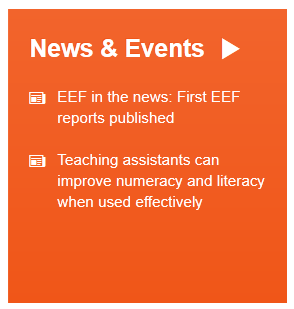The results of two randomised controlled trials published by England’s Education Endowment Foundation (EEF) on the 7th February 2014 noted that ‘teaching assistants can improve literacy and numeracy when they are deployed well’. Deploying TAs well included using them to support individual pupils within groups and delivering structured interventions.
One report relates to TAs’ impact on literacy using a ten week programme called ‘Switch-On Reading’ with year 7 pupils. Findings indicated that on average pupils made an additional three months progress, with even greater progress made by pupils eligible for free school meals and a low level of reading before the programme started. 308 pupils in 19 schools were involved in the research.
The other report evaluates ‘Catch Up’ numeracy, a one to one maths programme for primary aged pupils delivered at twice weekly sessions by TAs. The research (with 324 pupils in 54 schools) found that an average of three months progress was made by catch Up groups and four months progress by one to one support.
In total six reports were published and you can access them here – EEF Teaching Assistant reports
These are of interest to Teaching Assistants and schools. In addition they are of interest to university students who are studying education, learning and teaching. The EEF website is a useful resource to browse. You can read commentary and discussion about the research in a TES article here
You can access it here



February 14, 2014 at 10:05 am
The new evidence supporting the use of teaching assistants focused on two specific programmes: the 10-week Switch-on Reading scheme for 11-year-olds and the 30-week Catch Up Numeracy initiative for seven- to 11-year- olds.
It would be good to hear from any FDLT students who have experience of either of these programmes.
February 22, 2014 at 6:50 pm
Thank you for sharing this information, I have not come across these programmes of teaching but hope to find out more about them!
February 28, 2014 at 9:15 am
Yes, and I wonder if other programmes run along the same lines would have a similar impact, or if its something inherent in the content of those programmes?
March 6, 2014 at 1:58 pm
I am doing my BALT dissertation on students’ views of the Catch Up Numeracy programme in a secondary setting.
March 8, 2014 at 10:35 am
Oh, how interesting to research the students’ perspectives, Hayley. Do post what your thoughts are when you have completed your research.